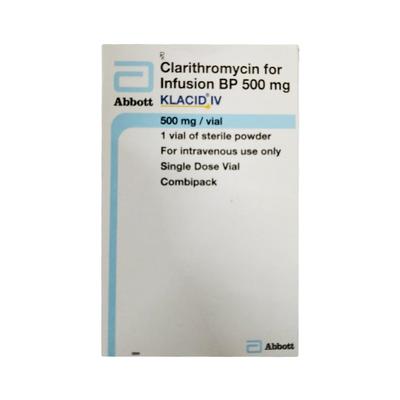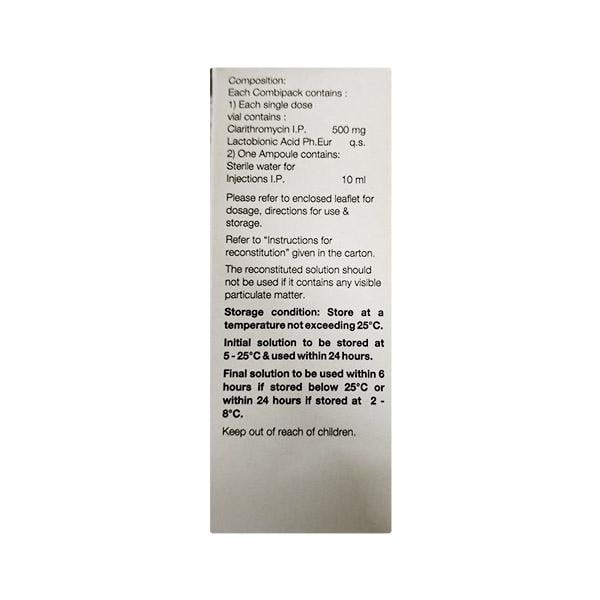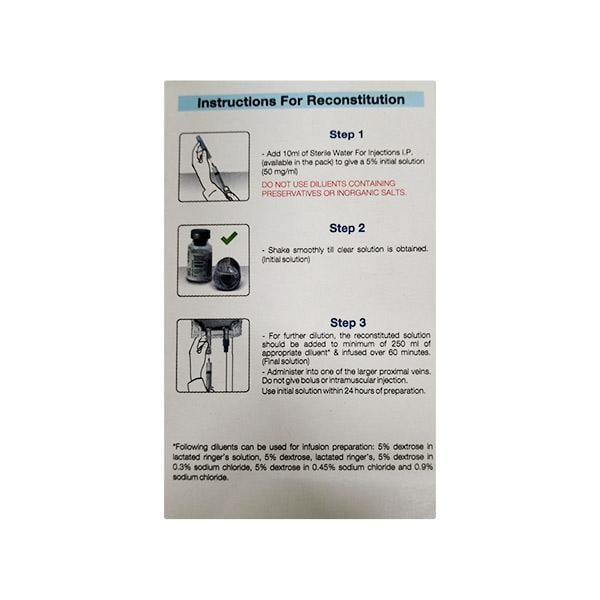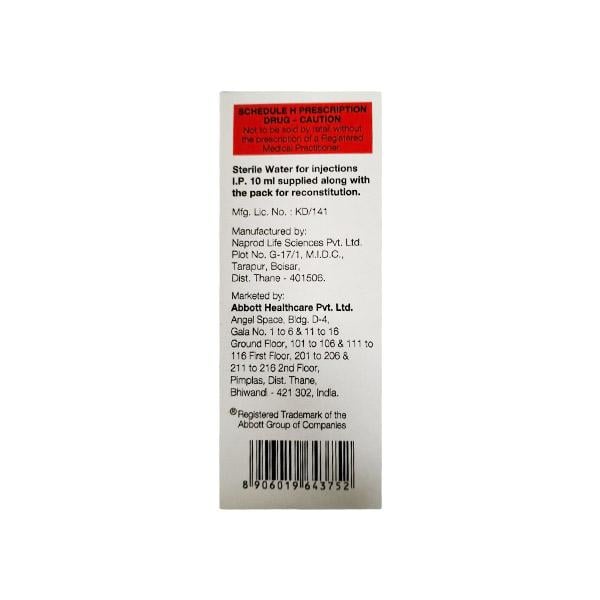

Netmeds First Membership
Quick Links
Introduction About KLACID IV 500MG INFUSION
KLACID IV 500MG INFUSION contains Clarithromycin which belongs to the group of medicines called Macrolide Antibiotics. It is used to manage severe bacterial infections such as chest infections (Ex. bronchitis and pneumonia), skin and soft tissue infections, throat and sinus infections in adults and children above 12 years of age.
Before prescribing this medicine, your doctor may want you to undergo a few diagnostic tests to determine the exact cause of your infection before starting with the medication.
Before receiving KLACID IV 500MG INFUSION inform your doctor if you are prone to fungal infections (Ex. thrush).
KLACID IV 500MG INFUSION is generally not recommended in patients with a history of severe kidney and liver disease, and heart rhythm disorders (Ex. ventricular cardiac arrhythmia, and fast heart rhythm).
It is also not recommended in patients with ‘long QT syndrome’ (abnormality in electrocardiogram). KLACID IV 500MG INFUSION is used only to manage children and adolescents above 12 years of age. Consult your doctor before receiving this medicine.
Before receiving the medicine tell your doctor if you are pregnant or breastfeeding. The most common side effect of receiving this medicine are soreness at the injection site, headache, and difficulty sleeping. Consult your doctor immediately if any of the above symptoms worsen.
Uses Of KLACID IV 500MG INFUSION
Used to manage:
- chest infections (Ex. bronchitis, pneumonia)
- serious skin and soft tissue infection (Ex. cellulitis)
- throat and sinus infections (Ex. tonsillitis, sinusitis)
How KLACID IV 500MG INFUSION Works
KLACID IV 500MG INFUSION manages the growth of bacteria by interfering with its protein synthesis and binds specific proteins present in the bacterial ribosomes, thus stopping the growth of the bacteria inside the body, which helps to reduce the infection and its symptoms.
How to use KLACID IV 500MG INFUSION
KLACID IV 500MG INFUSION will be given to you into a vein only by the doctor or a nurse. Your doctor will administer the correct dose and duration for you depending upon your age, body weight and severity of the infection.
Side Effects Of KLACID IV 500MG INFUSION
Common
- injection site soreness
- increased sweating
- nausea, vomiting
- tummy pain
- diarrhoea
- headache
- changes in severe taste
- changes in liver function test
- widening blood vessels (causing redness)
- difficulty sleeping
Uncommon
- oral and vaginal thrush (fungal infections)
- swelling, redness, and itchiness of the skin
- inflammation in the stomach and intestine
- stiffness, shakiness, muscle spasms
- drowsiness, tiredness, dizziness
- chills, fever, feeling weak
- decrease in white blood cells (leukopenia)
- decrease in neutrophils (neutropenia)
- increase or decrease in eosinophils
- amplify the immune response to a foreign agent
- anorexia, decreased appetite
- involuntary muscle movements
- anxiety, nervousness, loss of consciousness
- vertigo, ringing in the ears, hearing loss
- blood clot blockage in a lung leading to the artery (pulmonary embolism)
- anal pain, bloating, constipation, wind, burping
- cholestasis (bile cannot flow to the duodenum)
- chest pain, changes in heart rhythm (palpitation and irregular heartbeat)
- raised abnormal kidney levels in blood tests
- nosebleed, dry mouth
Rare
- hypoglycaemia (low blood glucose levels)
- hearing loss (generally reversible)
Consult your doctor immediately if you experience any of the following side effects after receiving KLACID IV 500MG INFUSION:
- severe or prolonged diarrhoea, with blood or mucus
- skin rash, skin irritation
- difficulty breathing, fainting
- swelling of the face, tongue, lips, eyes, and throat
- yellowing of the skin (jaundice)
- tender abdomen, loss of appetite
- pale stools, dark urine
- severe skin reactions with painful blistering of the skin, mouth, lips, eyes, and genitals (Stevens-Johnson syndrome/toxic epidermal necrolysis)
- red, scaly rash with bumps under the skin and blisters
- muscle pain or weakness (rhabdomyolysis)
- severe ulceration of the mouth, lips, and skin associated with illness
- inflammation of the internal organs
How To Manage Side Effects
Diarrhoea:
Drink lots of fluids to keep yourself hydrated. Avoid taking any medicine on your own for managing diarrhoea. Consult your doctor if the symptom did not improve.
Headache:
Rest and relax. Drink plenty of fluids such as water or electrolytes. Apply a pain-relieving balm on the head if required. Do not consume too much alcohol. Consult your doctor if the symptom did not improve.
Nausea or Vomiting:
Take this medicine with, or just after meals. Stick to simple meals. Avoid eating oil-rich or spicy foods.
Warning & Precautions
Pregnancy
KLACID IV 500MG INFUSION should be used with caution in pregnant women. Consult your doctor before receiving the medicine.
Breastfeeding
KLACID IV 500MG INFUSION should be used with caution in breastfeeding mothers as it is unknown whether it pass in the breast milk. Consult your doctor for advice before receiving the medicine.
Driving and Using Machines
Do not drive or operate any machines if you feel dizziness, vertigo, confusion, and disorientation after receiving KLACID IV 500MG INFUSION.
Kidney
KLACID IV 500MG INFUSION is generally not recommended in patients with severe kidney disease. It should be used with caution in patients with mild to moderate kidney problems. Consult a doctor before receiving KLACID IV 500MG INFUSION.
Liver
KLACID IV 500MG INFUSION is not recommended for patients with severe liver disease. It should be used with caution in patients with mild to moderate liver problems. Consult a doctor before receiving KLACID IV 500MG INFUSION.
Allergy
Do not receive KLACID IV 500MG INFUSION if you are allergic (hypersensitive) to Clarithromycin and other macrolide antibiotics or to any other constituents of KLACID IV 500MG INFUSION.
Heart Disease
KLACID IV 500MG INFUSION is not recommended for patients with heart rhythm disorders known as ventricular cardiac arrhythmia, including the type of ventricular tachycardia (torsades de pointes) and if you have long QT syndrome (showing abnormality in electrocardiogram). It should be used with caution in patients with mild to moderate heart problems. Consult a doctor before receiving KLACID IV 500MG INFUSION.
Others
KLACID IV 500MG INFUSION is not recommended for use if you are:
- have abnormal low levels of potassium and magnesium in the blood (hypokalemia, hypomagnesemia)
Before receivingKLACID IV 500MG INFUSION, inform your doctor if you are:
- prone to fungal infection (thrush)
Use in pediatrics:
KLACID IV 500MG INFUSION is not recommended for use in children below 12 years of age. Consult your doctor before receiving the medicine.
Use in geriatrics:
KLACID IV 500MG INFUSION should be used with caution in elderly patients as they are prone to develop torsades de pointes arrhythmias (fast heart rhythm that begins in your heart ventricles). Consult a doctor before receiving the medicine.
Interactions
A. Drug-Drug interactions:
Before receiving KLACID IV 500MG INFUSION, inform your doctor if you are taking any of the following medicine:
- medicines used to manage migraine (Ex. ergotamine and dihydroergotamine)
- medicines used to manage stomach problems (Ex. domperidone and cisapride)
- medicines used to manage hay fever and allergies (Ex. terfenadine and astemizole)
- medicines used to manage schizophrenia (Ex. pimozide)
- medicines used to reduce cholesterol (Ex. simvastatin and lovastatin)
- medicines used to manage heart problems and angina (Ex. ticagrelor and ranolazine)
- medicines used to manage gout (Ex. colchicine)
- medicines used to manage infections (Ex. rifampicin, rifapentine and rifabutin)
- medicines used to manage fungal infections (Ex. fluconazole and itraconazole)
- medicines used to manage poor circulations (Ex. cilostazol)
- medicines used to manage heart problems (Ex. digoxin, disopyramide and quinidine)
- medicines used to thin blood (Ex. dabigatran, rivaroxaban, and apixaban)
- medicine to manage epilepsy (Ex. carbamazepine, phenobarbital, valproate and phenytoin)
- medicines used for asthma (Ex. theophylline)
- medicines used as sedatives (Ex. alprazolam, triazolam or intravenous and oromucosal midazolam)
- medicines used for immune suppressants (Ex. ciclosporin, sirolimus and tacrolimus)
- medicines used to manage HIV infection (Ex. zidovudine ritonavir, efavirenz, nevirapine, atazanavir, saquinavir, and etravirine)
- medicines used to manage inflammation (Ex. corticosteroids like methylprednisolone)
- medicines used to manage high blood pressure and angina (Ex. verapamil, amlodipine, diltiazem)
- medicine to manage psychosis (Ex. quetiapine and other antipsychotic medicines)
- medicines used to manage high cholesterol (Ex. atorvastatin, and rosuvastatin)
- medicines used to lower blood glucose levels (ex. insulin, nateglinide, pioglitazone, repaglinide, rosiglitazone, gliclazide and glimepiride)
- herbal medicines used to manage depression (Ex. St. John’s wort)
- medicines used to manage stomach ulcers and indigestion (Ex. omeprazole)
- medicine to manage cancer (Ex. vinblastine and ibrutinib)
- medicines used to manage overactive bladder (Ex. tolterodine)
- medicine to manage opioid addiction (Ex. methadone)
- medicines used to manage rheumatoid arthritis and malaria (Ex. chloroquine and hydroxychloroquine)
- medicines used to manage impotency in males and pulmonary arterial hypertension (Ex. sildenafil, tadalafil and vardenafil)
- oral contraceptives
- medicine like antibiotics to manage bacterial infections (Ex. lincomycin and clindamycin)
Overdosage:
KLACID IV 500MG INFUSION will be given to you only by a doctor or nurse in a hospital, and so it is unlikely to receive an overdose. However, if you experience any unusual symptoms like vomiting and stomach pain. Contact your doctor immediately.
Synopsis
| Drug | : | Clarithromycin |
| Pharmacological Category | : | Macrolide antibiotics |
| Therapeutic Indication | : | Manages Bacterial infections |
| Dosage Forms | : | Tablet, Injection, Dry syrup, Oral suspensions, Gel, Granules, Lotion, Solution |
More Information
- Keep KLACID IV 500MG INFUSION out of reach of children
- Store at room temperature
FAQs About KLACID IV 500MG INFUSION
Is it safe to consume alcohol while receiving KLACID IV 500MG INFUSION?
Alcohol may reduce the effect of KLACID IV 500MG INFUSION, hence therefore it is advisable to avoid drinking alcoholic beverages while receiving KLACID IV 500MG INFUSION.
Can I drive after receiving KLACID IV 500MG INFUSION?
KLACID IV 500MG INFUSION may cause dizziness, vertigo, confusion, and disorientation. Do not drive or operate any machines in such case after receiving KLACID IV 500MG INFUSION.
What KLACID IV 500MG INFUSION used for?
KLACID IV 500MG INFUSION is used to manage severe bacterial infections such as chest infections (Ex. bronchitis and pneumonia), skin and soft tissue infections, throat and sinus infections in adults and children above 12 years of age.
If I start feeling well, can I skip the dose of KLACID IV 500MG INFUSION?
No. You should complete the full course of KLACID IV 500MG INFUSION as prescribed by your doctor. Your doctor will administer the right dose depends on your age, body weight and severity of the infection.
Will KLACID IV 500MG INFUSION affect the contraceptive pill that is taken?
Yes. KLACID IV 500MG INFUSION may interact with birth control pills and lowers its efficiency. So, you should tell your doctor if you are using any birth control pills. Your doctor may suggest alternative contraception barriers.
Can KLACID IV 500MG INFUSION cause diarrhoea?
Yes, KLACID IV 500MG INFUSION can cause serious diarrhoea during or after receiving KLACID IV 500MG INFUSION. Usually, discontinuation of medicine can subside diarrhoea. However, if diarrhoea persists or if there is blood in the stool then immediately consult a doctor.
References
1. KD Tripathi. Clarithromycin. Essentials of Medical Pharmacology. Seventh Edition,2013. Page - 803.
2. Karakike, Eleni, Brendon P. Scicluna, Maria Roumpoutsou, Ioannis Mitrou, Niki Karampela, Athanasios Karageorgos, Konstantinos Psaroulis et al. "Effect of intravenous clarithromycin in patients with sepsis, respiratory and multiple organ dysfunction syndrome: a randomized clinical trial." Critical Care. 2022. [Accessed on 22nd June 2022] https://ccforum.biomedcentral.com/articles/10.1186/s13054-022-04055
3. Laboratories Alcala Pharma S.L. Electronic Medicine Compendium (emc). [Revised in November 2021] [Accessed on 10th June 2022] https://www.Medicines used.org.uk/emc/files/pil.8825.pdf
4. Delpharm Saint Remy. [Revised in February 2021] [Accessed on 10th June 2022] https://www.hpra.ie/img/uploaded/swedocuments/ad4ec3ef-066d-4e10-bacd-f54457ea65db.pdf
5. Laboratorios Alcala. [Revised in June 2018] [Accessed on 10th June 2022] https://www.hpra.ie/img/uploaded/swedocuments/0068c6b0-13c0-4bc0-8fc8-b91c539c8294.pdf
6. Max Health Ltd. [Revised in August 2021] [Accessed on 10th June 2022] https://www.medsafe.govt.nz/profs/datasheet/c/clarithromycininf.pdf
Useful Diagnostic Tests
- Complete Blood Count
- Peripheral Smear Examination












